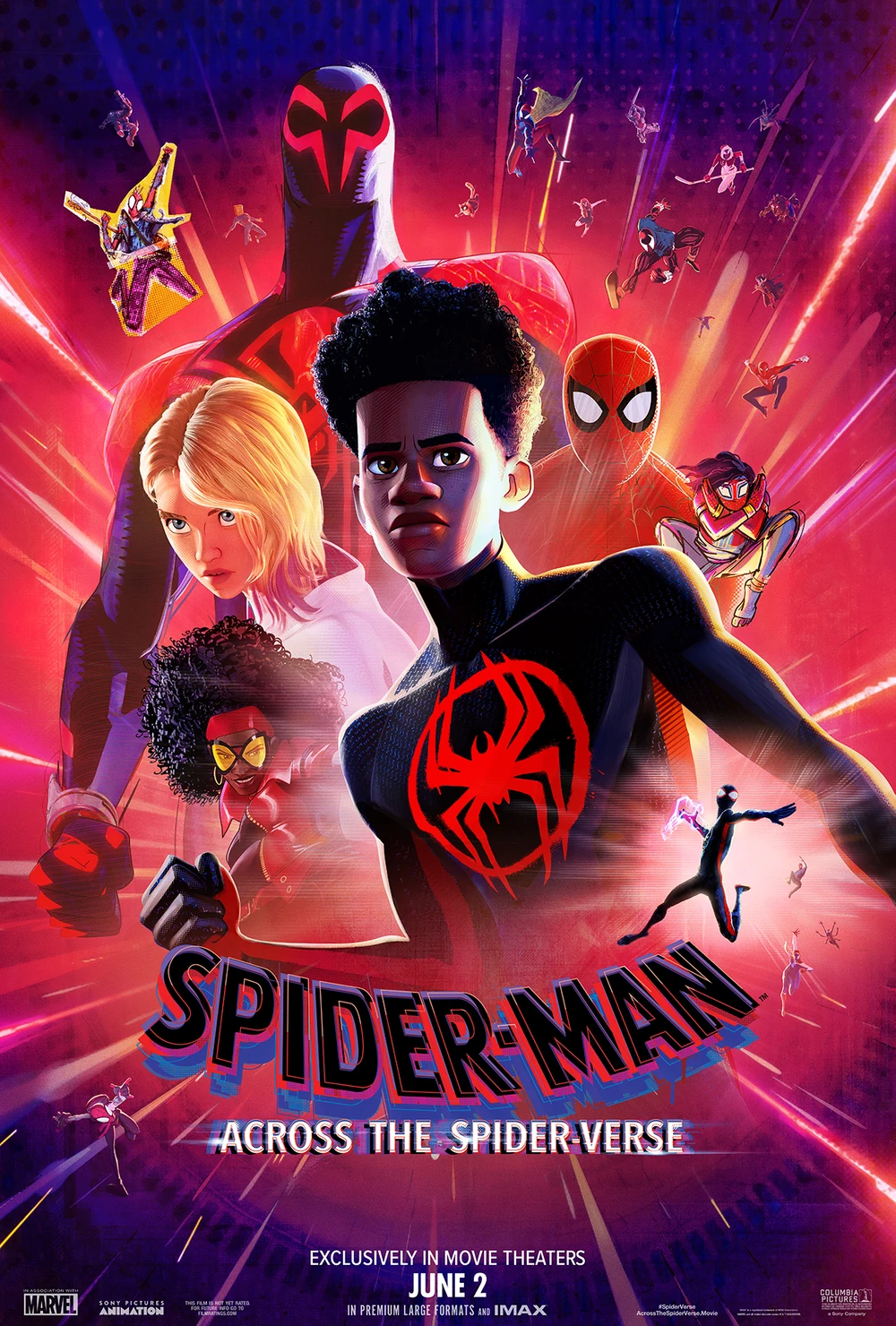This isn’t really a blog for reviews – and I’m not about to break form here by even trying to review Spider-Man: Across the Spider-Verse. Apart from anything else, it’s been just over a week since I saw it and I’m still trying to digest it all.
So, if you want my review, here it is: go and watch the damn film. Or better, watch Into the Spider-Verse first, and then go out and immediately watch Across. I really enjoyed Into, and Across outdoes it in nearly every aspect. The animation is stunning. The soundtrack is perfect. The script is tight and economical, but leaves heaps of room to breathe and enjoy everything – until the film doesn’t want you to breathe, and then it explodes into a frenetic display of fireworks. The characters are well-drawn and each feels unique and real and compelling. It’s funny, it’s bold, and it’s utterly engrossing. Not a minute of its runtime is wasted, though it doesn’t ‘rush’ by either – it’s easily the most breath-taking cinematic experience I’ve had in years.
Even the ending is compelling – fair warning, unlike Into, this is not a ‘complete’ story. Yet, despite the preponderance of the modern blockbuster to finish on a cliffhanger and/or to promise more in the sequel, this one felt earned and logical. Maybe because it’s an actual cliffhanger, not just cutting a scene in the middle while our heroes are in peril. Or maybe because it does tell a complete arc, with satisfying development for all of our primary heroes (and one or two of our primary villains to boot) – the story is literally too big to contain in a single film, but the characters and situation have satisfyingly developed from where they started. Or maybe it’s simply because, unlike the constant spin-off hooks and sequel bait that other blockbusters insist on including, this film feels laser-focused, despite its sprawling plot and cast of characters. Every scene, every line in this film is in the film because it needs to be in this film, not for the sake of setting up Spider-Man India: Origins: A Spider-Verse Story – Part I.
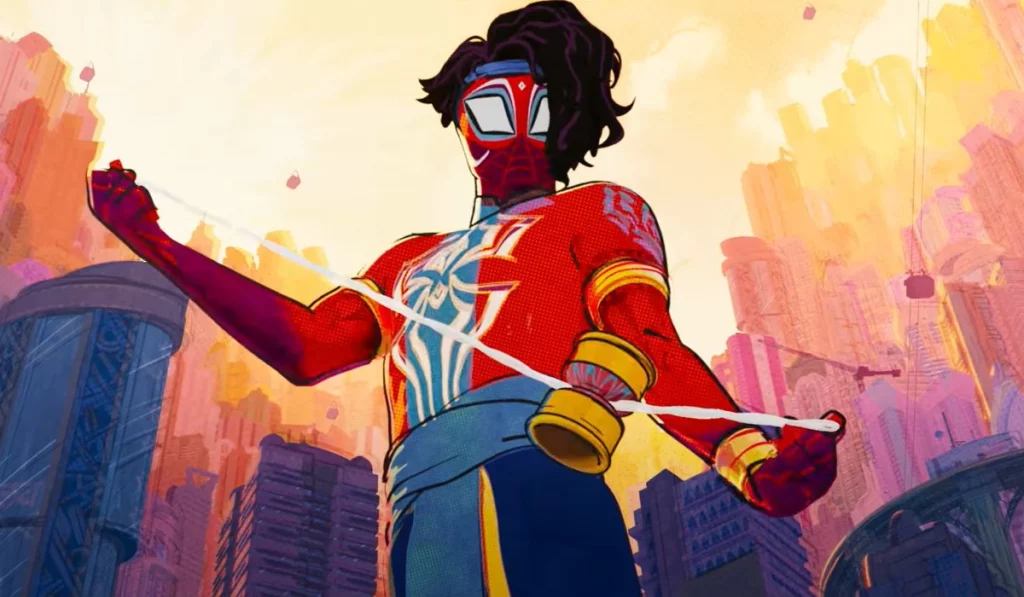
Anyway, I’m already calling it – this is the best film trilogy of the ‘20s, and I cannot wait for March 2024.
But like I said, this isn’t really a site for reviews, I’m more interested in digging into the details of story-telling than assessing the merits of a given story. And, while there’s a lot going on in Across that I’m still processing, and it’s difficult to assess the story as a whole until next year, and many cleverer people are already hard at work at breaking the story down, I did want to bring together a few connections that I noticed in the film, some things that I’ve seen other people comment on individually but (as far as I’m aware) haven’t really been connected yet.
Oh, and full spoilers from here on out, obviously. If you haven’t seen Across yet, then go check it out, now, enjoy the ride, thank me later, and seeya back here in a few hours!
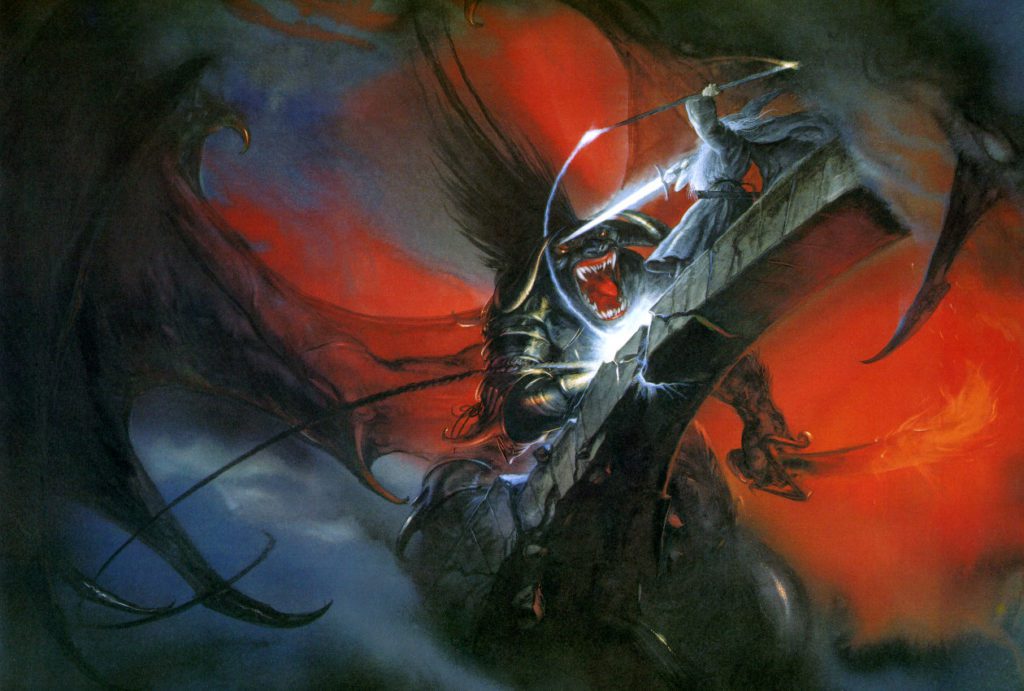
As is typical of a superhero origin story, a prominent theme of Into is that of believing in yourself, of living up to your potential. This, of course, is pretty much Miles’ entire arc, and it’s also mirrored in Peter B’s (literal) B-plot. By the end of the film, both of them have accepted what they can do, have taken on that Spider-Man mantle of responsibility, and both have made their ‘leap of faith’.
So far, so good. Something about Across that I haven’t seen any focused discussion on, though, is its new focus…not on self-belief, since the heroes of Into have already had that journey. No, Across is concerned rather with belief in others, and in examining the pitfalls of failing to recognise the strengths of those around you.
Let’s start with Peter B. As a character and as a superhero, Peter B is incredibly easy to underestimate. He’s comical, lackadaisical, seemingly unaffected by the gravity of the terrible situations around him. Of all the characters, he’s the most likely to suffer some shockingly funny injury (right from his introduction scene in Into, as a ‘homeless corpse’ being unceremoniously dragged across the city by Miles). Even the way he moves is comical, often lacking the grace that his fellow Spider-people possess. All of this is to say, it’s easy to be dismissive of Peter B and his capabilities – heck, even his own manner (which has gone from the self-aggrandising of Into to being disarmingly self-deprecating) makes it easy to see him as being a figure worthy of ridicule, not respect.
Yet all of this makes it easy to forget that Peter B is legitimately good at being Spider-Man, and the evidence is there right from the start. He’s quick-witted, good-hearted, and highly practised. His first ever conversation with Miles sees Peter B escape, steal the ‘goober’, find out where to go to get a new goober, and so on. He’s able to memorise Olivia’s password just from watching her type it. His plan to break into Alchemax goes pretty much exactly as he’d stated it would (with plenty of unforeseen hiccups along the way, to be sure…yet he manages to overcome all of them). Further, for all Peter B’s own seeming lack of respect in both films, he’s invariably aware of the bigger picture, and is always willing to do the right thing.
As for his actual physical qualities and abilities, Peter B might not be the ‘best’ Spider-Man – but I’d argue that he’s the ‘most’ Spider-Man, and that it shows. Where other characters move with dynamism, leaping and swinging with athleticism and grace and power, Peter B just…walks. Or if and when he does swing, it’s with such effortless languidity and so little movement that it feels unremarkable. And that’s the point – for him, it is. He’s been Spider-Man for so long that he is literally going through the motions – he doesn’t really need to try or to think about it any more. Other Spider-people move with the grace of dancers, the agility of warriors. Peter B moves with the ease of a guy moving…there isn’t really a better way to put it.
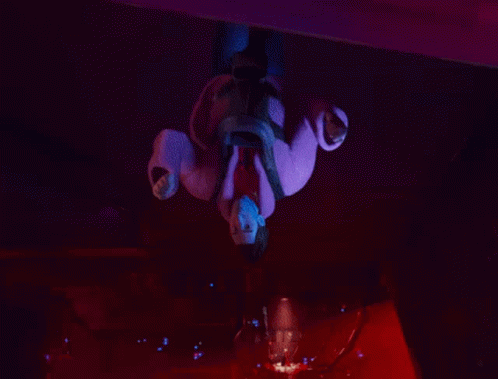
Even Peter B’s preponderance for taking hits can be understood as a byproduct of this – since, for all that he is frequently battered, bruised and injured, we never actually see him take serious or sustained damage. He’s no more or less indestructible than most Spider-people – but Peter B knows how much he can be hurt, and he’s learnt that he can take the little hits.
Far from being the ‘janky old broke hobo Spider-Man’ that Miles initially sees him as, Peter B is a really really good Spider-Man (well, he’s a bit older and probably slightly broke, but the point still stands). Peter B might not be an amazing Spider-Man, but he is very very good at being Spider-Man – it’s second nature to him at this point. But Miles, and plenty of other characters, don’t realise that, at least not at first, and it’s often to Peter B’s advantage.
Miguel, for example, certainly hasn’t learnt that lesson.
Of all the characters in Across, I think Miguel O’Hara might be the one I’m most fascinated by. There’s clearly a lot of story left to tell regarding him – what are his origins, exactly? How much of the multiverse does he actually understand, and how much is he wrong about…or lying about? Where is he on that slippery slope, and where will he end up? But these are all questions for Beyond the Spider-Verse to answer, and questions that I’m not especially interested in speculating about (though I am eager to learn the answers to them).

However, if there is a character who exemplifies Across’ theme of characters misjudging others, Miguel would be that character. Consistently, and always to his own detriment, Miguel shows himself to be incapable of respecting the capabilities of those around him.
Take Peter B. The dynamic between Miguel and Peter B is fascinating to me, because for much of the film, Peter B actually seems to like Miguel, to be on his side. Peter B genuinely wants Miguel’s mission to succeed, genuinely wants to help Miguel protect the multiverse.
Miguel, though, has very little respect for Peter B, which then creates this tragic gulf between the two and Miles. For all his ‘I’m a terrible mentor’ schtick, Peter B has been and continues to be an excellent mentor to Miles, and he recognises that Miguel is communicating with the younger Spider-Man in all the wrong ways. So Peter B tries to get Miguel to be friendlier, kinder, easier in manner. He tries to talk Miguel down not by scolding him, or by reprimanding him, but by lightening his dour and irritable manner.
But Miguel, in turn, sees Peter B as just another irritating and quippy Spider-person, and consistently fails to recognise that he might actually have something to offer. Miguel constantly fails to listen to Peter B’s advice, whether it is given overtly or not, and so dooms his own efforts. Miguel is unable to see past the clownish facade of Peter B, is unwilling to question whether this middle-aged jokester who’s also been Spider-Man for over half his life might have anything to genuinely offer, and so Miguel disregards Peter B. And, in the end, Peter B is proven to have had a point. For all Miguel’s righteous fury and aggression and superiority, Miles refuses to go along with him. Gwen is banished (again, despite Peter B’s stumbling advocacy to maybe talk it out). And a host of other Spider-people, Peter B included, are disillusioned with Miguel’s narrow-minded righteousness and set out on their own.
(Notably Gwen, arguably the film’s co-protagonist with Miles, is able to recognise that which Miguel can not – of all the Spider-people she recruits in the film’s final act, it is implied that Peter B is the first, even before she visits Spider-Punk. Gwen’s arc in this film is also fascinating to me, and I’ve got a follow-up post in the works that I hope to finish within a week or so.)
But to be fair to Miguel, his lack of regard toward Peter B is nothing special – Miguel doesn’t seem to value anybody’s advice, a crippling fault for the self-appointed guardian of the entire multiverse. Right from the start, we see Jessica Drew encouraging Miguel to take Gwen into the team, and Miguel resisting. Later, he is unable to recognise his own failings in capturing (let alone negotiating with) Miles, pinning the blame on Gwen and refusing to hear any arguments otherwise.
Speaking of Miles, of course, Miguel’s underestimation of Miles is what allows Miles to escape in the first place. Miles outright tells Miguel that he has a plan, that he’s not running blindly, and even that isn’t enough to give Miguel pause. Miguel’s rage blinds him to the very possibility that Miles might be able to outwit him, and so Miguel fails to prepare or provide any contingencies whatsoever. With hundreds, perhaps even thousands of superheroes at his disposal, Miguel is unable to formulate a better plan than ‘chase Miles’, because he does not believe that Miles would ever come up with a better plan than ‘run away’ – and so, against all odds, Miguel manages to fail.
But even before the chase across Nueva York, Miguel clearly holds Miles in disregard, to an almost paradoxical level. Miguel’s claims that Miles ‘shouldn’t be Spider-Man’ may seem reasonable (if arrogantly framed), given the circumstances of Miles being bitten in the first place. Yet if that’s the case, if Miles isn’t ‘meant’ to be Spider-Man, then why is Miles still beholden to the canon events of a Spider-Man? If Miles isn’t meant to be Spider-Man, why must he still be held to the standards of being a Spider-Man? Miguel’s disdain for Miles, coupled with his unquestioning and unquestionable demands of Miles, betray his deeper lack of regard for anyone not named Miguel O’Hara.
That, of course, is even assuming that Miguel is right about the entire canon event theory in the first place (I’m convinced there’s more to be revealed about all that)…but even if we give him full credit and say that he believes his theory is correct, that there is no willing deceit on Miguel’s part, even then his lack of flexibility is damning. Either Miles was meant to be Spider-Man (in which case he is ‘worthy’ of being Spider-Man), or he was not (in which case he does not need to prove any worth). Miguel’s grim determination that both be true only reflects poorly on Miguel, and ultimately ensures that he ‘loses’.
I’m not quite done with ragging on Miguel, either. Because Miguel’s not only caused his own problems by disregarding Peter B, and exacerbated them by disregarding Miles, he’s also allowed his ‘enemies’ to have all the tools and knowledge to now react, because Miguel also completely disregarded his most nominal of teammates – Spider-Punk.
From Hobie’s introduction, his anti-authoritarian and contrarian ways set him up as a foil and an irritation to Miguel, and it seems clear that there is little love between the two. Yet Miguel tolerates Hobie’s presence, because Miguel doesn’t see any threat or danger in the punk’s rebellious words. Miguel is irritated by Hobie, but he sees Hobie as nothing more than an irritation.
Yet Hobie is arguably the most consistent threat to Miguel’s entire organisation. He’s always a voice of quiet criticism in Miles’ ear, helping Miles to see beyond the glitz and the fantasy of Miguel’s organisation (and, it’s implied, doing the same for Gwen and who knows who else well before Miles shows up). In his few scenes, Hobie undermines the legitimacy, the morality and the purpose of Miguel’s entire mission, despite being under Miguel’s nose. Even a line from Hobie’s very introduction, played for a joke as it is, is layered with criticism of Miguel.
Hobie Brown: I’m not a hero, ‘cos calling yourself a hero makes you a self-mythologizing narcissistic autocrat.
Spider-Man: Across the Spider-Verse,
Is Hobie right? Probably not, or at least not wholly. But is Miguel a ‘self-mythologising narcissistic autocrat’ who ‘calls himself a hero’? Absolutely.
Then, come the end of the film, it’s revealed that not only has Hobie been undermining faith in Miguel, but he’s been stealing and studying the technology of the Spider-Society so as to build his own multiversal transporter…perhaps even transporters. Had Miguel paid even the slightest heed to Hobie’s sedition, had he kept a closer eye on his activities or cared enough to be wary of Hobie, none of this would have been possible.
Heck, even Hobie’s exit from the Spider-Society shows his canny awareness and cements Miguel’s lack of awareness. As Miles flees and Miguel idiotically charges after him, Hobie opens a portal and steps through with a muttered, “Just for the record, I quit.” Hobie’s achieved everything he wants to and, by leaving while Miguel is distracted, has ensured that Spider-Man 2099 won’t give a second thought to losing Spider-Punk, giving him the time and space he needs. Where Peter B tries to overcome Miguel’s arrogance, and Miles fights against it, Hobie weaponises it, and thus ensures that Miguel is in a far worse position than he was at the start of the film.
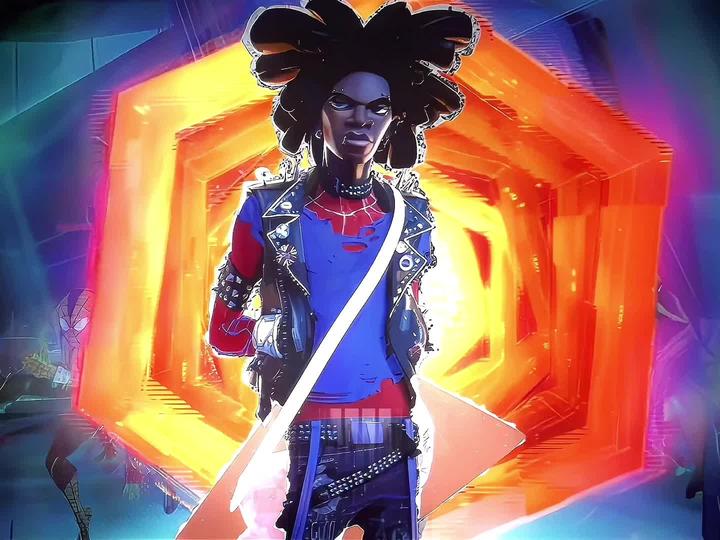
This post has been quite unkind to Miguel thus far, though not unfairly so. However, I said at the beginning that this lack of regard, this failure to recognise the skill of others, is a theme of the entire movie, and this theme goes beyond Miguel (though he is the chief representative of it). And, ironically enough, Miguel is one of the chief figures who does fully recognise the dangers posed by yet another of the film’s bumbling and comical and horribly dangerous characters. The Spot is acknowledged by Miguel – even as the eldritch villain is dismissed by Miles.
That is the arc of the Spot, after all. He wants Miles’ recognition, the satisfaction of Miles’ fear, and Miles refuses to give him either…well, at least, Miles refuses to give him either until it is far too late. Just like Miguel. Had Miles treated the Spot with more gravity, he may well have been able to actually neutralise and capture the villain, rather than literally leaving him hanging mid-fight. Had Miles given the Spot his full attention, the Spot may well have never had the opportunity to retreat and re-examine his powers, to experiment and discover how to amplify his abilities.
Of course, all of this is a ‘what if’ – it’s entirely possible that the Spot would have still ascended to become the cosmic multi-dimensional being that the film ends with, even if Miles had taken him seriously. Yet the fact remains that Miles did not, and that afforded the Spot the chance to become dangerous – just as how Miguel failed to respect his allies and potential allies, and so escalated a situation that he really could have dealt with.
As for the Spot himself, Across ends with him at his most powerful and most dangerous, having received no comeuppance as of yet. But in a curiously nice little bit of cyclical narrative, the Spot’s hyperfixation with Miles, his obsession with becoming Miles’ nemesis, also means that he’s spent precious little time or attention considering the other Spider-folk out there, to the point where he is outright dismissive of Gwen, Hobie and Pavitr, simply using his powers to dump them out of the way while he engages with and obsesses over Miles. While it’s much too early to guess how the existential dangers posed by the Spot may be negated, it would not surprise me if the villain’s hatred of Miles blinds him to the danger posed by Miguel, by Gwen and Peter B, and to the Spider-multitude that are surely willing to take him down.
Into the Spider-Verse was, at its core, a classic hero’s journey, a classic lesson in believing in yourself. One of the strengths of Across the Spider-Verse is that it allows its characters to maintain the development of the previous film, and that it does not retread old ground in telling its story. If Into is about learning self-confidence, then Across is arguably about overcoming arrogance. About recognising one’s own shortcomings, and being mindful of the strengths of others. It’s a lesson that Miguel and Miles both needed to learn, and that may yet lead to the Spot’s undoing.
It also makes Miguel and the Spot a strangely satisfying pair of antagonists, because in underestimating Miles, Miguel repeats Miles’ own error with the Spot. And, as stressed previously, Miles and Miguel’s mistakes and pride have real and meaningful negative consequences for them, lending weight to their errors and needlessly exacerbating difficult situations.
Without Beyond having come out yet, it’s difficult to draw a satisfying conclusion – it’s possible that these themes will be laid aside for the third part. Or that they’ll lead to some new and unexpected turn of events. But I’m pretty confident that, whatever happens from here, it’ll be worth the ride…it’s not often that I get a good feeling about an unreleased sequel, but the fact that Across and Beyond have clearly been conceived and made as two halves of a larger story, and the sheer confidence and audacity and brilliance that Across demonstrates, have me excited for the conclusion next year. So, yeah, Spider-Verse – who would’ve guessed it’d be so damn good?
~~~~~~~~~~~~~
Thanks for reading – feel free to check out anything else you may be interested in on the blog, there’s plenty more to discover! Follow me on Facebook and on Twitter to stay up to date with The Blog of Mazarbul, and if you want to join in the discussion, write a comment below or send an email. Finally, if you really enjoyed the post above, you can support the blog via Paypal, and keep The Blog of Mazarbul running. Thanks for reading, and may your beards never grow thin!
